By:
- Erika Johnson
Published Date
By:
- Erika Johnson
Share This:
Take the Leap
A conversation with alumna and NASA astronaut Jessica Meir on the eve of her commencement address
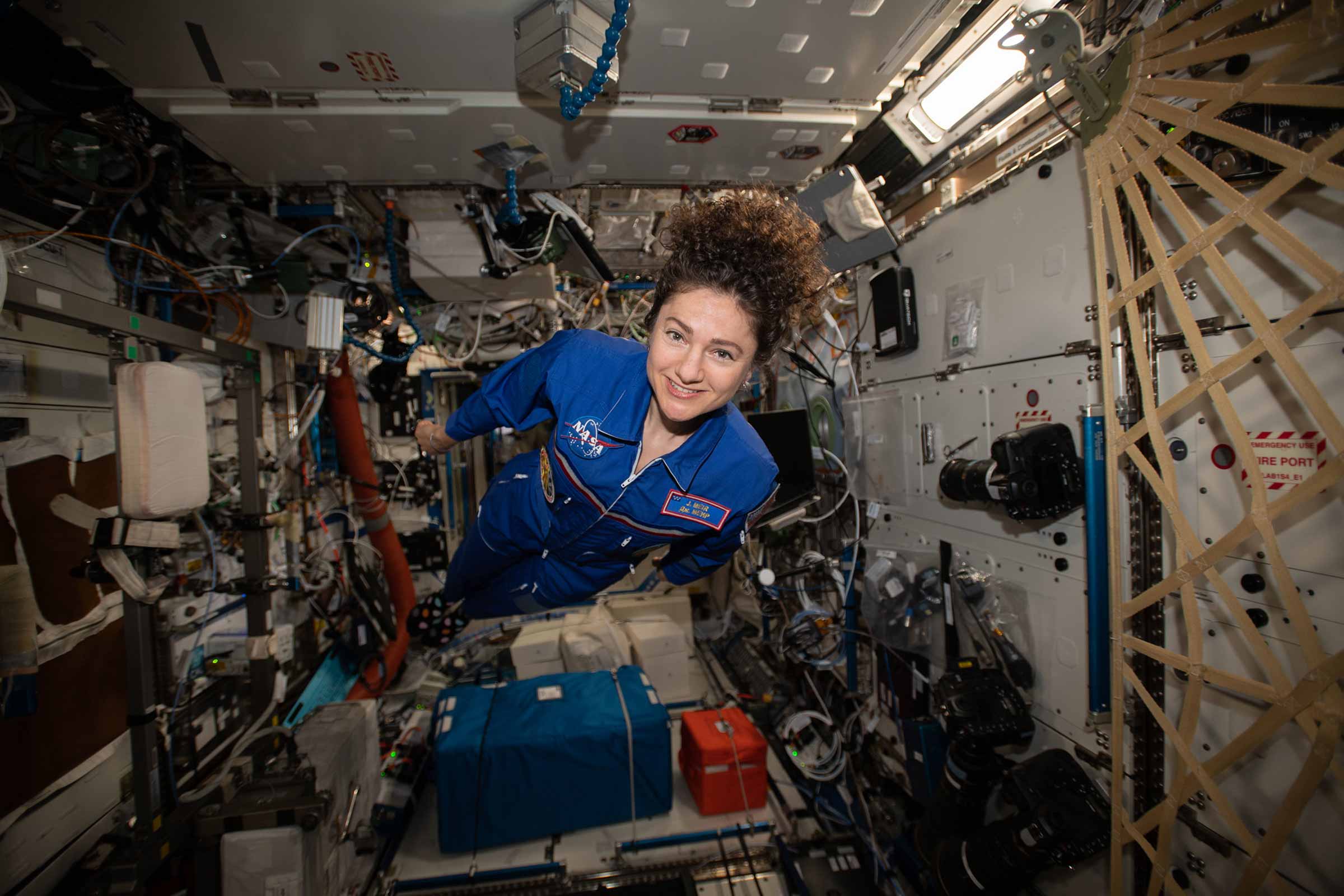
Meir hovers for a portrait in the weightless environment of the International Space Station. Photo by NASA, March 29, 2020.
Jessica Meir had dreamed for decades about what it would be like to sail among the stars. And when she got her chance in 2019, the experience surpassed all of her expectations. This weekend, the UC San Diego alumna will return to the university to share the wonders of her journey to space as a NASA astronaut and offer words of wisdom to the Class of 2022 at All Campus Commencement on June 11.
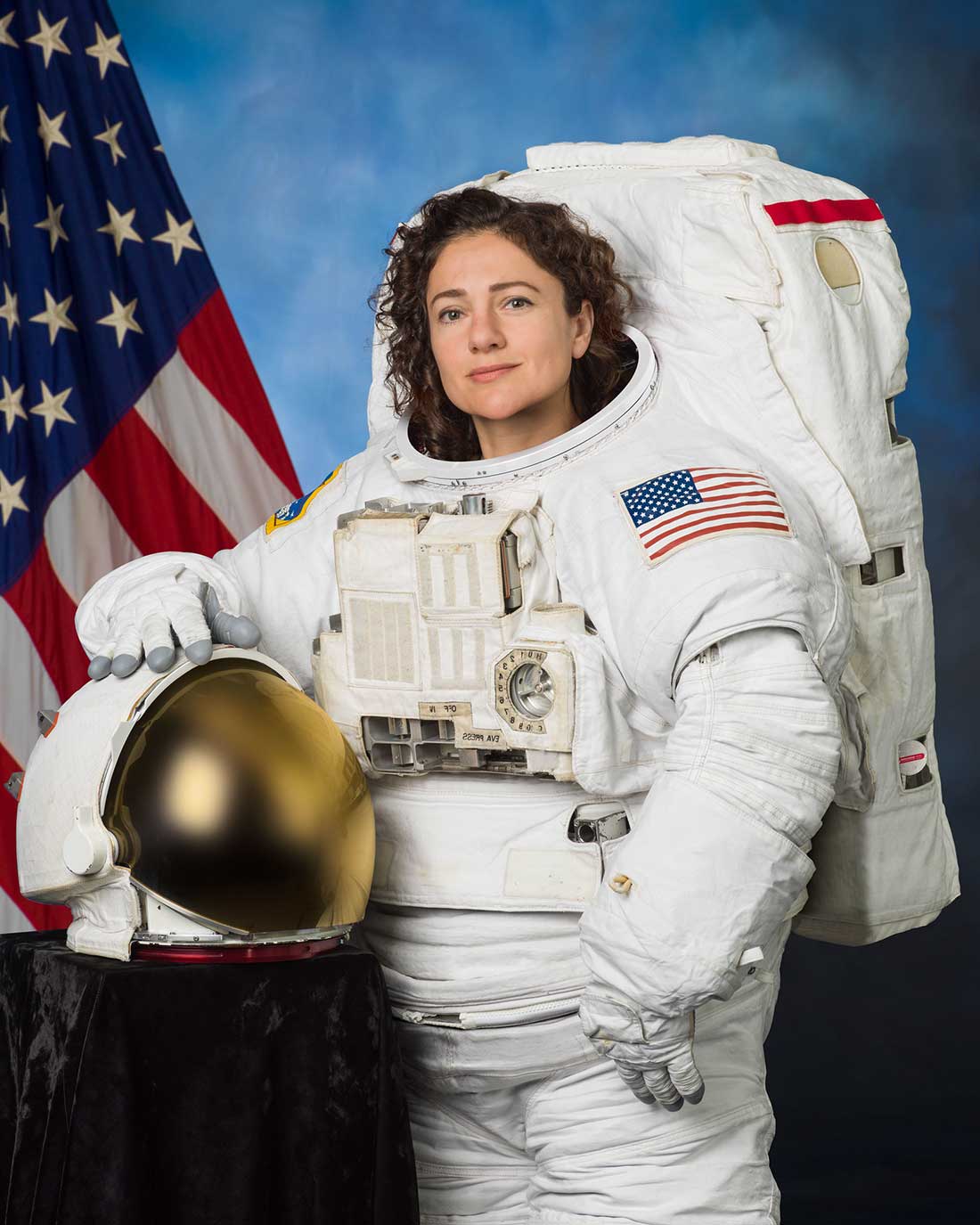
Portrait of NASA Astronaut Jessica Meir in an Extravehicular Mobility Unit (spacesuit). Photo by Josh Valcarcel/NASA, September 2018.
In advance of her visit, we spoke with Meir about the potential for scientific breakthroughs without the influence of gravity; how her love for our planet exponentially grew after seeing the magnificent landscapes from above; her belief in the power of getting out of your comfort zone to achieve great heights—literally; and how even astronaut training could not prepare her for the pandemic when she returned home in 2020.
Q. You believe in taking risks to achieve great things, even if it means facing failure along the way. Have there been moments of disappointment on your journey to becoming an astronaut?
A. I absolutely believe that it is necessary to take risks and push yourself slightly outside your comfort zone—that's when the great things happen. Perhaps my biggest failure was in trying to become an astronaut. I had first applied in 2009 when I was completing my doctoral studies at Scripps Institution of Oceanography. I made it all the way to the final round of about 40-50 people, but when I arrived for the interview, I saw I was surrounded by incredible people with remarkable resumes and extraordinary accomplishments. I thought, okay, I'm never going to get selected. When the calls went out that year, I was not among them. Knowing that I had come that close and it hadn’t worked out really hurt.
It would have been quite easy at that point to just give up because I had my other career as a scientist that I loved. When the chance came four years later to apply again, I thought, maybe I shouldn’t take that risk and put myself through the mental anguish. But if I hadn't put myself out there again and applied, I wouldn't be here today. I hope that I can show that you have to take risks and fail on the way to making your dreams come true.
Q. You embrace challenges with zeal. Is there anything that you fear?
A. As astronauts, we train for years in advance of space missions, so we are incredibly prepared for everything that comes our way. Even though I haven't had to respond to a real emergency scenario in the space environment, I have been through simulations so many times that it's almost like I have muscle memory. We also have thousands of people working in mission control who have designed all of these systems and help maintain them to keep us safe. That's the top priority of everything that we do here at NASA: safety.
The only thing that I've ever feared as an astronaut—and I've heard this from many other astronauts as well—is the fear of making a mistake. You are so fortunate to be the one in space, and there are so many people that are depending on you and have been involved in this whole process. You feel this huge responsibility because you don't want to let anyone down.
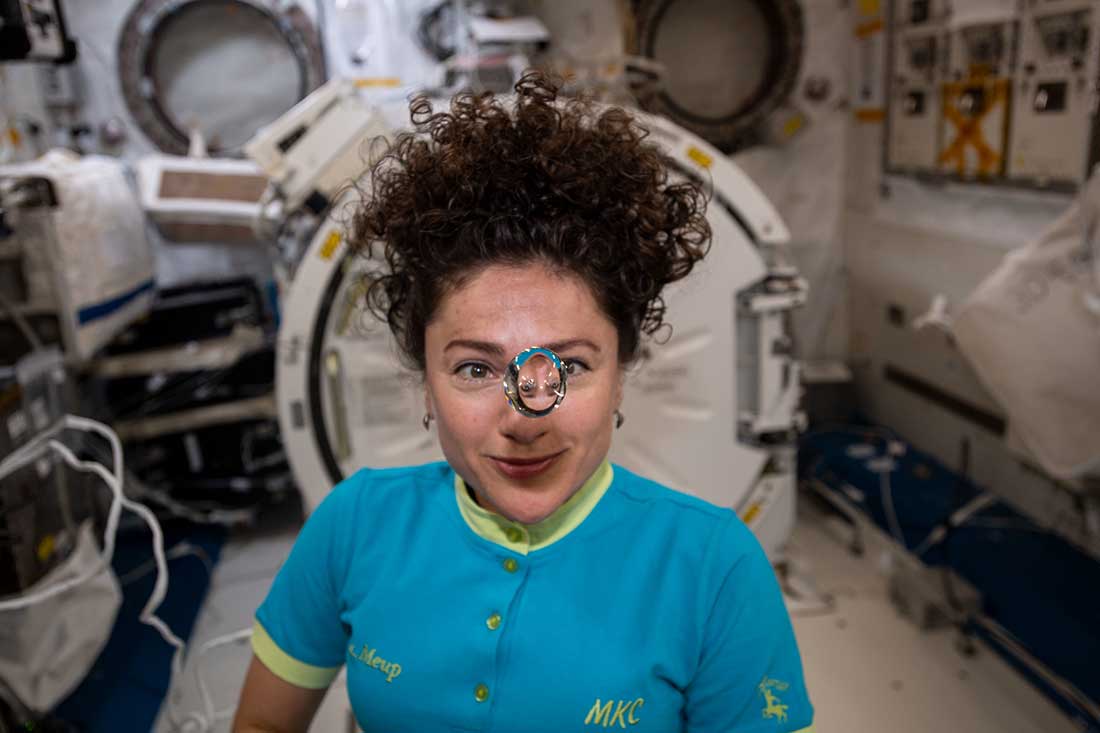
Meir observes a floating sphere of water formed by microgravity inside the International Space Station's Kibo laboratory module. Photo by NASA, February 9, 2020.
Q. What is something you learned about yourself while working at the International Space Station that you didn’t expect?
A. I’ve wanted to go to space since I was 5 years old. I thought I was prepared for what that might be like because I had contemplated it so much. What surprised me was that it was even more incredible than I ever imagined. When you're anticipating something, you often build it up and sometimes it becomes a disappointment later. Yet being in space surpassed all of my expectations. Just being up there, weightless and floating 24 hours a day, having the privilege of looking down at the earth below, it changes you as a person.
Q. You’ve conducted thousands of experiments throughout your career. What is the most exciting part about conducting science in space?
A. If you think about it, we have one variable here on Earth that is always with us in any scientific system: gravity. It affects us all and everything around us. You can only imagine what might happen to those systems if you remove this omnipresent variable. That's what makes the science we do on the space station so exciting. From physiology and medical experiments to combustion experiments and cell biology—you name it and we're doing it up there. With this variable removed, who knows what's going to happen? There are so many areas of potential for extraordinary findings that we can unravel when we're doing experiments in space.
Q. We are experiencing an echo pandemic right now with many impacted by mental health struggles. How do you maintain wellness when you face challenges?
A. Psychological wellbeing is a very important part of our job as astronauts and plays a big role in our selection as well. We have a number of teams working to support our mental health, especially when we’re on long-duration missions in an isolated environment that contains a lot of stressors. During space missions we receive care packages and have the chance to do regular video chats with family members once a week.
There are many parallels to what we go through as astronauts and what the whole world has experienced with the COVID-19 pandemic. I launched to the International Space Station in September 2019 before the pandemic began, and I landed April 2020. Coming back to a completely different planet was much more difficult for me to deal with than the isolation and confinement on the space station. We tried to share some of the lessons we learned while living in space, such as maintaining a consistent schedule, exercising regularly and making time to communicate with family members.
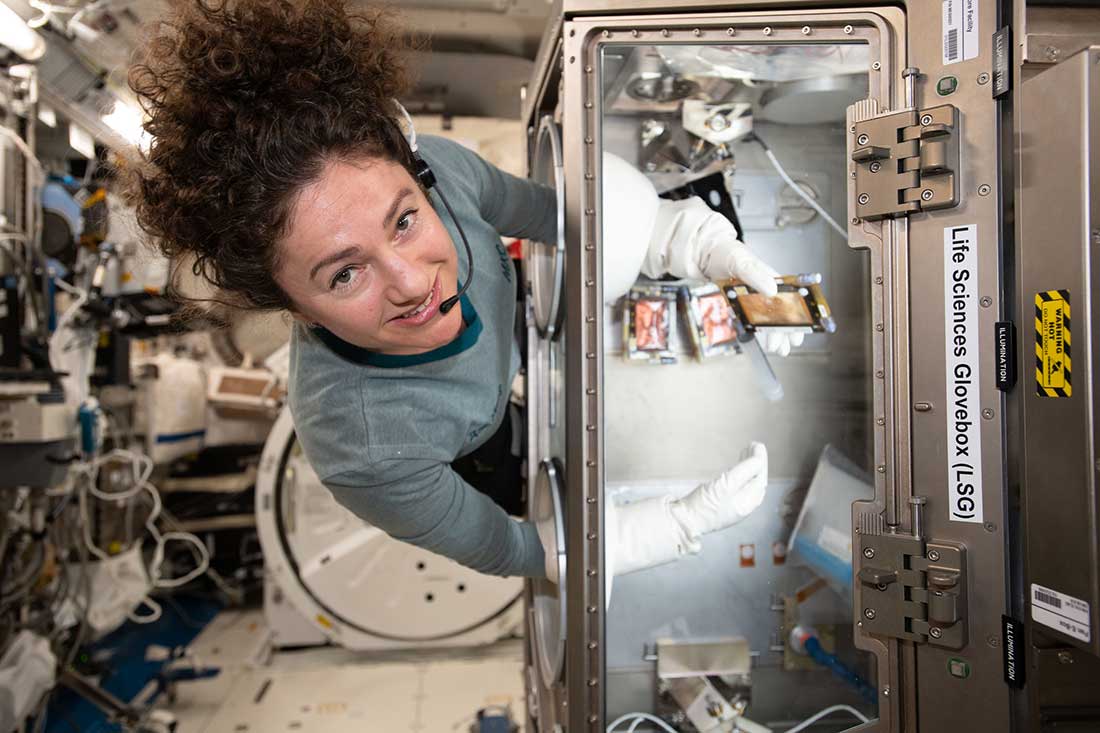
Meir conducts an experiment inside the Life Science Glovebox that compares the microgravity-exposed samples to magnetically levitated samples on Earth for insights into bone ailments such as osteoporosis. Photo by NASA, March 3, 2020.
Q. You’ve explored the deep ocean and the edges of the universe. What are the connections, and what draws you to these environments?
A. There are absolutely connections between ocean sciences and space sciences. A key similarity is the need for a life support system. In the ocean, this may mean scuba diving or using a robotic submersible to carry us into the water. In space, we may do a space walk or use a robotic spacecraft to complete our explorations.
What draws me toward both pursuits is the spirit of exploration—going a little bit further, taking a look around the corner to see what places we haven't gone before. I've always been drawn toward extreme physiology; my expertise is the physiology of animals living in extreme environments. That's easily connected to what we're doing here in space, except now I am the animal in the most extreme of environments.
Q. Did your worldview change after returning to Earth?
A. I’ve always been an environmentalist, but I can say it now resonates even more loudly. Seeing Earth from above, you realize how special it is and how we need to protect it. I remember watching the gradient blues of the thin, tenuous band of the atmosphere. You can see it change from a darker blue at the surface, then it gets thinner and thinner with altitude. In no time at all, it has disappeared into the void and blackness of space. When you see that with your own eyes, this extraordinary palette of beauty and how connected all the landforms are, it is so utterly gorgeous and breathtaking.
Being in space also made me realize just how interconnected everything is. Looking down at the earth from the space station, you see contiguous land masses with no borders. And you realize that we're all in this together, from addressing the COVID-19 pandemic to taking care of our planet. It’s a view that I really hope I can share with more people.
I also noticed it's really an innate characteristic of humans to focus on small, trivial matters right in front of us. Sometimes, we need to be reminded to take a step back and not focus so much attention on those little things. Space does that for you. I feel so incredibly fortunate to have gained that kind of perspective.
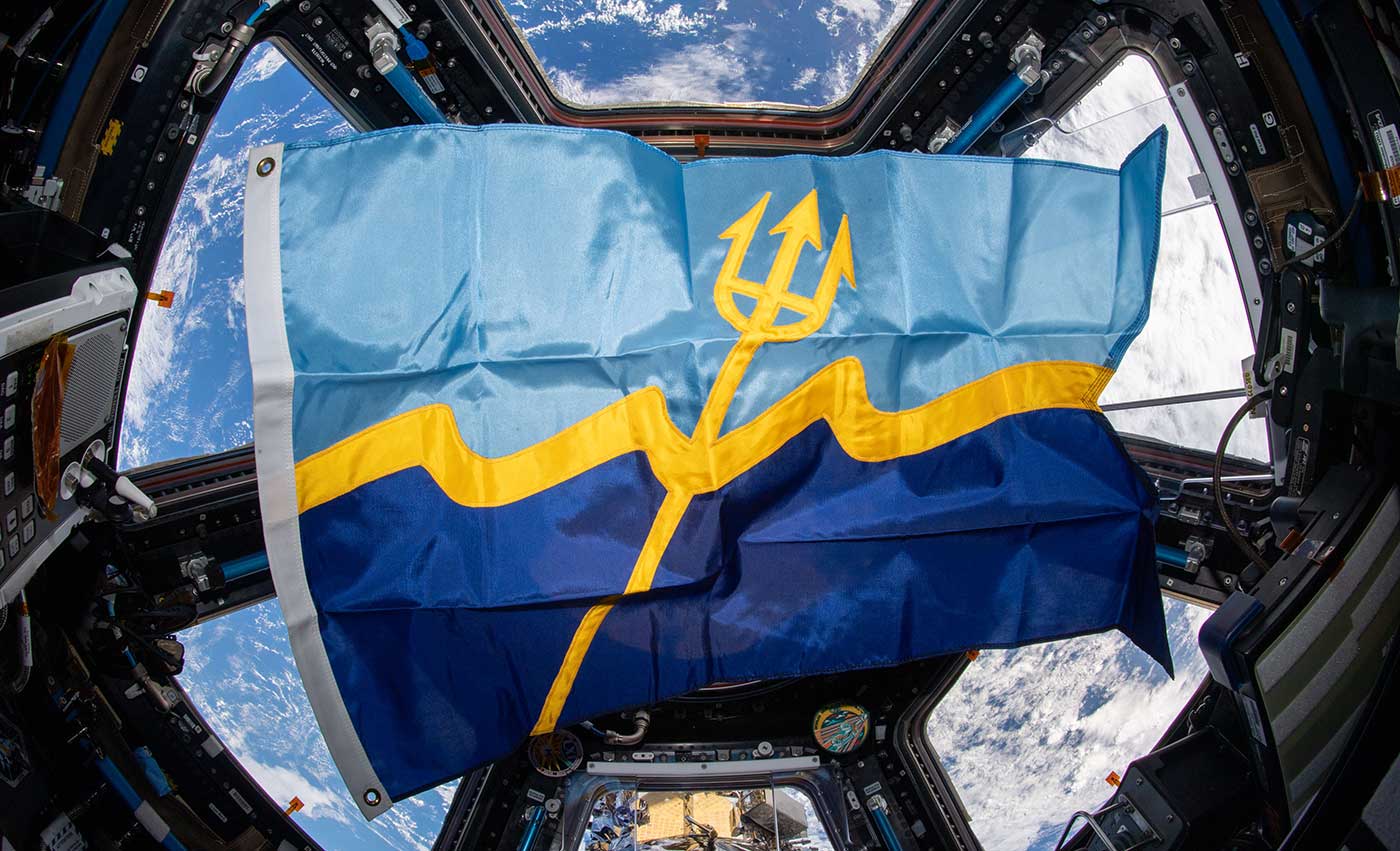
Share This:
You May Also Like
Stay in the Know
Keep up with all the latest from UC San Diego. Subscribe to the newsletter today.



